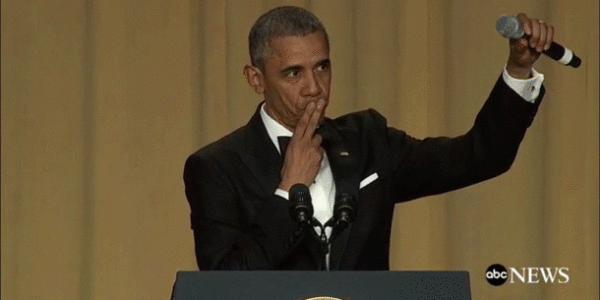Mic drop, the act of dropping one’s microphone (literally or figuratively) as a dramatic gesture at the end of a speech, rap, or other vocal performance, gained a friend in high places in May when US President Barack Obama did it at the end of his speech to the final White House Correspondents’ Dinner of his administration. Originally emerging from hip-hop culture, Obama’s mic drop makes a nice bookend of his tenure in the White House, pairing with 2008’s “fist bump heard ‘round the world” after he beat Hilary Clinton to become the Democratic Party’s nominee for President of the United States.
2008’s heated contest between Obama and Clinton in the Democratic Primaries attracted unprecedented international interest and first brought the term superdelegate into wide usage. This year the main focus has been on the Republican Primaries, in which Donald Trump has emerged as the presumptive nominee, having secured the requisite number of delegates. However, the Republican Party has different terminology. In lieu of superdelegates we have unbound delegates (which is basically the GOP version of superdelegates), who are free to vote any way they choose. Bound delegates (and pledged delegates in the Deomcratic Party), must reflect the majority vote of their state’s primary election.
Although the frontrunner in total delegates, Trump was allegedly trailing behind Ted Cruz in unbound delegates (before Mr Cruz finally suspended his campaign in early May). However, in late May 15 unbound delegates agreed to support him, tipping the balance and making Trump the presumptive Republican nominee (he will not be the official nominee until the Republican National Convention). In celebration, Trump has promised America will “win bigly”.
Yes, “bigly”.
Now, you may find this hard to believe, but you will find the word bigly in Collins English Dictionary – defined as an archaic adjective meaning “comfortably habitable”. Never a very common word, its etymological root is the chiefly Scottish verb big meaning “to build”. It is not the adverb of the common English adjective big meaning “large”. At least, not yet. Hopefully this Trumpism is not an indicator of the rhetoric we can expect if The Donald actually wins the election in November. But considering the Bush years, the English language could be in for a rough ride.
Meanwhile in the UK, a synthetic form of cannabis commonly called Black Mamba has emerged as a major health threat in prisons. Black Mamba is a New Psychoactive Substance (NPS), also known as a legal high, and therefore are legally nebulous.
And speaking of high things, a receptionist who was sent home without pay for refusing to wear high heel shoes has highlighted the inherent sexism in what some companies call their female grooming policy. Her campaign has garnered support from woman and even from men, some of whom voluntarily wore heels to work and emerged with tales of horror.



